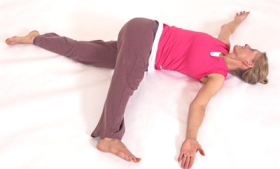Simple tips for sound sleep

Do you have trouble falling asleep? Do you rue the fact that you can no longer sleep like a baby? Then it’s time to discover simple insomnia remedies from the experts and get rid of those raccoon-like dark circles around your eyes, once and for all.
1. Unwinding
In the old days, before electricity came and enabled man to change night into day, people used to begin to wind down soon after sunset. They would relax, have leisurely chats with their family members, maybe they even read holy scriptures or prayed together as a family. In other words, they gave their bodies, and their brains specially, enough time to relax and slow down before calling it a night.
 As Dr. Michael Breus, clinical psychologist and author of The Sleep Doctor’s Diet Plan puts it, “Sleep is not an on-off switch. It’s more like slowly easing your foot off the gas.” So, well before your bedtime, try to mentally shrug off all thoughts of the workplace or family worries. Listen to soothing music. Enjoy quality time with your family. Do anything that will take your mind miles away from your cares.
As Dr. Michael Breus, clinical psychologist and author of The Sleep Doctor’s Diet Plan puts it, “Sleep is not an on-off switch. It’s more like slowly easing your foot off the gas.” So, well before your bedtime, try to mentally shrug off all thoughts of the workplace or family worries. Listen to soothing music. Enjoy quality time with your family. Do anything that will take your mind miles away from your cares.
2. Putting away your phone, computer, iPad, etc. by dinner time
Are you glued to different gadgets till late in the night? Well, start putting them to bed much before you’re ready to curl up in bed yourself. A simple tip for sound sleep, though difficult to follow. But you’ll have to bite the bullet if you want to fall asleep easily.
Research by the University of Basel and an Osaka University has shown that blue wavelengths produced by LED light bulbs, smartphones, and other gadgets significantly suppress the production of melatonin, the hormone that controls our sleep-wake cycle. The lower production of melatonin in the body caused by the use of such devises at night results in stimulation of the brain and consequently, troubled sleep.
3. Daily exercise
 Multiple scientific studies indicate that people who are physically active sleep better than those who have a sedentary lifestyle.
Multiple scientific studies indicate that people who are physically active sleep better than those who have a sedentary lifestyle.
However, many sleep experts disapprove of exercising late in the evening because the upsurge in the level of the excitement-boosting (and sleep-inhibiting) hormone adrenaline resulting from vigorous exercise takes several hours to drop back to normal. So try to squeeze in time to exercise daily – but in the morning or earlier in the evening.
4. Meditation
Meditation induces the central nervous system to relax. How to meditate? Concentrate on the words as you say a prayer or read some spiritually uplifting literature, sit in a relaxed pose with eyes shut and focus on your breathing… engaging in simple stuff like this for a few minutes each day will calm you down and help you enjoy sound sleep at night.
Sarah McLean, a meditation teacher in Arizona, and author of Soul Centered: Transform Your Life in 8 Weeks With Meditation, says, “Everyone can meditate. Any activity can become a meditative experience if you’re really present in the moment and engage your senses.”
5. Yoga stretches
A number of yoga asanas or poses are known to be powerful cures for insomnia. These can be done just before bedtime and even after getting into bed. Dr. Timothy Morgenthaler, M.D., of the well-known Mayo Clinic says, “Gentle yoga or progressive muscle relaxation can ease tension and help tight muscles to relax.”
 Here are three of the many simple asanas for troubled sleepers interested in trying yoga for curing insomnia.
Here are three of the many simple asanas for troubled sleepers interested in trying yoga for curing insomnia.
6. Eating sleep-supporting evening meals and snacks
Once daylight begins to fade, our body starts releasing more melatonin. But as we get older, the capacity of our body to produce this sleep-promoting hormone reduces. Fortunately, there are ways of getting over this.
You’ve heard of food for thought. But did you know about food for sleep? Foods rich in vitamin B6 (a key component for producing melatonin) like bananas, salmon, tuna, cod, peanut butter, pistachios, chickpeas, and certain fortified cereals are recommended by doctors as bedtime snacks.
Dr. Shelby Harris, director of the behavioral sleep medicine program at the Sleep-Wake Disorders Center at Montefiore Medical Center in Bronx, N.Y., suggests snacking on half a banana with a tablespoon of peanut butter, or a whole wheat cracker with some cheese, around half an hour before going to bed.
7. Avoiding sleep-inhibiting foods
Sorry, this could be bad news for those habituated to guzzling coffee or saying “Cheers!” before hitting the sack. If you’re having a tough time dropping off to sleep, go easy on coffee (a rich source of the stimulant – caffeine) and alcohol. Here’s why.
Alcohol may make you fall asleep faster, but several research programmes have shown that the hot stuff can damage a person’s sleep cycles by reducing and disrupting the deeper, more restful stages of sleep. As for coffee, the American Academy of Sleep Medicine, says it can take around 8 to 14 hours for the effects of brain-stimulating caffeine to wear off fully. One of the main reasons for insomnia is an over-alert brain.
8. Aromatherapy
Aromatherapy oils like lavender oil are known to have a calming effect. You could sprinkle these on a handkerchief or tissue and sniff their calming fragrance for a while. Dr. Harris says, “Try taking a hot bath with lavender oil before bed to relax your body and mind.”
9. Shutting out the light
Many insomniacs are sensitive even to dim light such as slivers of light slipping in through a window or from under the door, the moonlight, or the light of gadgets being charged. Dr. Shrives says, “Light is a powerful signal to your brain to be awake.” So black out all such light sources. Draw the curtains at night or try using a sleep mask.
10. Mantram repetition
A mantram or mantra is a spiritual word or phrase, or a short prayer repeated silently to ourselves to improve our power of concentration, and calm the body and mind. Mantram repetition is advised anytime, but preferably after waking up and before going to bed.
Jill Bormann, Ph.D., RN, Research Nurse Scientist at Veterans Affairs (VA), San Diego, California recommends mindful repetition of any suitable mantram according to the faith you practice, such as: Namo Butsaya (Nah-mo Boot-sie-yah) – I bow to the Buddha; Lord Jesus Christ, Son of God, have mercy on me; Om Namah Shivaya (Ohm Nah-mah Shee-vah-yah) – I bow to Shiva; Allahu Akbar (Ah-lah-oo Ahk-bahr); and Shalom (Shah-lohm).
If none of these simple insomnia remedies work for you, then see a doctor for sleeplessness could also be a sign of some other physical disorder such as a thyroid problem or Vitamin D deficiency.
And now, here’s some soothing music for your late night listening pleasure: The theme song “I’ll be loving you eternally” from Charlie Chaplin’s famous 1952 movie Limelight, composed by Chaplin himself! The first is the instrumental version, the second the Spanish version sung by the popular Spanish singer Roberto Carlos.
Both have visuals from this classic film in which you can see Chaplin as he really looked, without the trademark ‘little tramp’ make-up and toothbrush moustache. Take your pick and enjoy a sound sleep tonight!
A small request. How about sharing any simple insomnia remedies that worked for you?
See ya! And keep smiling!
